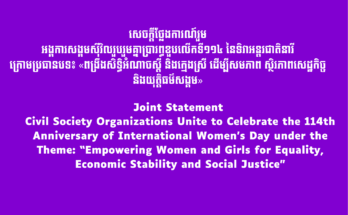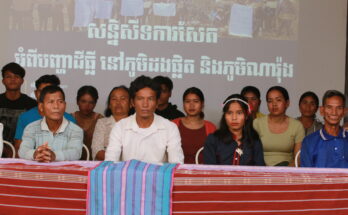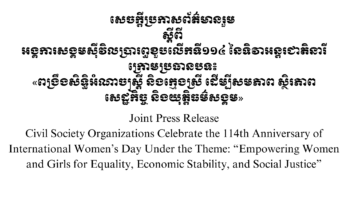Statement
A Cambodia that Tolerates Dissent Sends the Right Message to President Obama
Phnom Penh, 15 November 2012 — The Cambodian Human Rights and Development Association (ADHOC) expresses its condemnation at the arrest today of eight community activists in Thmar Kaul Village, Po Sen Chey District, Phnom Penh. The community activists are guilty of nothing more than exercising their legitimate right to freedom of expression, and coming in the wake of intimidation and harassment of civil society groups attempting to organize and hold meetings ahead of the upcoming ASEAN summit in Phnom Penh, the arrests and detention of these community activists is yet another example of the Cambodian authorities’ disregard for human rights. The Cambodian authorities have expressed a desire to show the “good” face of Cambodia to the world, however, their intolerance of dissent and willingness to use the police to stifle freedom of expression instead demonstrates little more than the shrinking democratic space in the country.

At 7:30am on November 15 2012, eight community activists—Un Sokny; Kin Leang; Chray Nim; Khea Sary; Uch Srey; Mach; Sem Phal Sokunthy; Yun Sovanna; and Phung Sopheap—were arrested in Thmar Kaul Village, Po Sen Chey District, Phnom Penh, after writing the word “SOS”, on the roof of their building. Their plea for help was written beside a picture of the President of the United States, Barack Obama. The eight are currently being detained at the Sangkat Kakab police station while the Prosecutor decides the charges to be brought against them. Residents in Po Sen Chey District are currently locked in a land dispute with authorities ahead of the ASEAN Summit. They have been told that they must vacate their properties and forfeit their land to make way for a security area around Phnom Penh International Airport, where foreign leaders are shortly due to arrive. ADHOC has repeatedly called for fair compensation for the residents. This compensation has not been forthcoming, and instead the security zone appears to be little more than another case of forced eviction in a country beset with forced evictions, land grabbing and ecologically and socially damaging Economic Land Concessions (ELCs), amidst a general disregard for the land rights of poor and marginalized Cambodians.
The eight community activists were exercising their right to freedom of expression in an attempt to bring their plight to the attention of foreign leaders. Freedom of expression is a fundamental freedom and is intimately linked with the conditions of transparency and accountability that are necessary in a fully functioning democracy.  Freedom of expression is guaranteed under Article 41 of the Cambodian Constitution, in addition to article 19 of the Universal Declaration on Human Rights (UDHR). It is also incorporated into Cambodian law by Cambodia’s ratification of the International Covenant on Civil and Political Rights (ICCPR) in 1992, which provides for freedom of expression under Article 19. As this article states: “this right shall include freedom to seek, receive and impart information and ideas of all kinds, regardless of frontiers, either orally, in writing or in print, in the form of art, or through any other media of his choice”. Therefore, not only is the issue raised by the community activists an important one; they have every legal right to raise it.
Freedom of expression is guaranteed under Article 41 of the Cambodian Constitution, in addition to article 19 of the Universal Declaration on Human Rights (UDHR). It is also incorporated into Cambodian law by Cambodia’s ratification of the International Covenant on Civil and Political Rights (ICCPR) in 1992, which provides for freedom of expression under Article 19. As this article states: “this right shall include freedom to seek, receive and impart information and ideas of all kinds, regardless of frontiers, either orally, in writing or in print, in the form of art, or through any other media of his choice”. Therefore, not only is the issue raised by the community activists an important one; they have every legal right to raise it.
There is no little irony that the community activists were arrested when sending a message to President Obama. Only last week President Obama was re-elected to office after a lively and long-fought presidential election in which freedom of expression was crucial to the democratic process. Moreover, freedom of expression is enshrined in the Constitution of the United States and therefore the exercise of this right would surely be welcomed by the delegation from the United States. Instead, in their heavy-handed suppression of this basic right and arbitrary arrest of the community activists the Phnom Penh authorities have shown how far a gulf there is between the human rights protections guaranteed under domestic and international law and the extent to which they are respected in practice.
 The 2012 ASEAN Summit presents Cambodia with a unique opportunity to show its commitment to human rights. The arrest of the eight community activists gives the opposite message. If the Cambodian authorities truly wish to show the best of the country, then it must be willing to tolerate criticism and not attempt to stifle the democratic space in the country.
The 2012 ASEAN Summit presents Cambodia with a unique opportunity to show its commitment to human rights. The arrest of the eight community activists gives the opposite message. If the Cambodian authorities truly wish to show the best of the country, then it must be willing to tolerate criticism and not attempt to stifle the democratic space in the country.
For more information, please contact:
Mr. Ny Chakrya, Head of Monitoring Section: 011 274 959
Mr. Neil Loughlin, Technical Assistant: 092 648 318; loughlin.adhoc@gmail.com
Mr. Nicolas Agostini, Technical Assistant: 078 405 024; agostini.adhoc@gmail.com



